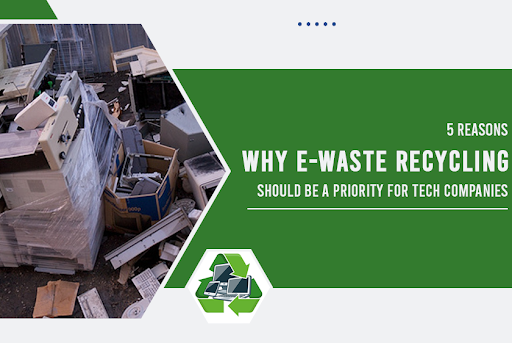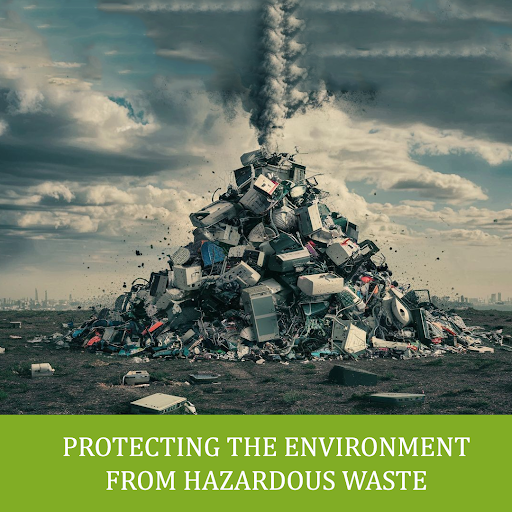
5 Reasons Why E-Waste Recycling Should Be a Priority for Tech Companies
How often do you upgrade your tech gadgets? What happens to your old devices once you discard them? Many of these outdated electronics become electronic waste, or e-waste, contributing to a growing environmental and health crisis. As tech companies continue to innovate and release new products, the volume of electronic waste will going to increase. It is important for consumers to recycle or dispose of their old devices responsibly and for tech companies to take responsibility for the environmental impact of their products. Electronic waste poses significant ecological threats and represents a loss of valuable resources. This blog will discuss five compelling reasons why e-waste recycling should be a main priority for tech companies.
Why should tech companies consider e-waste recycling-
1. Protecting the Environment from Hazardous Waste

Electronic waste contains hazardous materials like mercury, lead, and cadmium, which can dissolve into the soil and water, causing severe environmental damage. According to the Global E-waste Monitor 2023, around 59.4 million metric tons of electronic waste were generated worldwide in 2022. These toxic substances can contaminate ecosystems, harm wildlife, and affect human health. When electronic waste is improperly disposed of, the harmful chemicals can seep into groundwater or be released into the atmosphere through incineration.
By prioritizing e-waste recycling, tech companies can help prevent these pollutants from entering the environment. Recycling processes are designed to safely manage and neutralize hazardous materials, ensuring they do not cause ecological harm. This practice contributes to cleaner air, water, and soil, ultimately protecting public health and preserving biodiversity.
2. Conserving Valuable Natural Resources
Electronic devices are made from precious materials, including gold, silver, and rare earth elements. Mining these materials consumes significant energy and depletes natural resources. The United Nations University reported that, in 2022, electronic waste contained $57 billion worth of recoverable materials. By recycling electronic waste, tech companies can help conserve these precious resources, reducing the need for environmentally destructive mining practices. It saves resources and minimizes the energy used in manufacturing new products from raw materials.
3. Boosting Economic Growth and Job Creation
Recycling electronic waste can create economic opportunities. The recycling industry generates jobs in various sectors, from collection and transportation to processing and refurbishment. A study by the Institute for Local Self-Reliance found that recycling 10,000 tons of electronic waste creates 296 jobs compared to only 36 jobs from landfilling the same amount. Moreover, recovering valuable materials from e-waste can reduce manufacturing costs for new devices. Companies can reuse these materials, decreasing their dependence on expensive raw materials and improving their bottom line. Additionally, selling refurbished electronics can open new revenue streams for tech companies.
4. Ensuring Compliance with Legal Regulations
Many countries have enacted strict regulations regarding e-waste disposal. In the European Union, the Waste Electrical and Electronic Equipment (WEEE) Directive mandates that tech companies must manage and recycle their waste. Similarly, several states have their own electronic waste management law in the United States. Noncompliance with these rules may lead to significant fines and damage to a company’s reputation. By adopting comprehensive electronic waste recycling programs, tech companies can ensure they comply with legal requirements, avoid penalties, and enhance their corporate image as responsible and sustainable businesses.
5. Fulfilling Corporate Social Responsibility (CSR) Goals
E-waste management aligns with the principles of corporate social responsibility (CSR). Tech companies must act in the best interests of their stakeholders, including employees, customers, and the community. By implementing proper tech waste management initiatives, companies can demonstrate their commitment to earth sustainability and social responsibility. This can enhance their brand image, build customer loyalty, and attract socially conscious investors. Moreover, companies that prioritize electronics recycling often enjoy better relationships with regulators and local communities.
Final say!
By prioritizing e-waste recycling, tech companies can become part of the solution to a growing environmental problem. It’s a responsible business practice that benefits the planet, consumers, and the company itself. So, let’s pledge to move away from a throwaway culture and embrace a more sustainable future for technology.
Read Our More Blogs:
How Can Individuals Safely Dispose of Personal Electronics with Reecollabb?
Comparative Guide: Certified vs. Non-Certified E-Waste Recyclers
Follow us:







